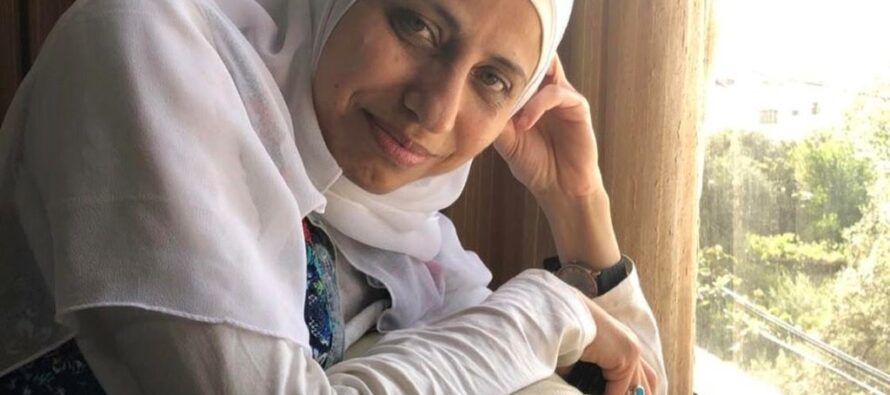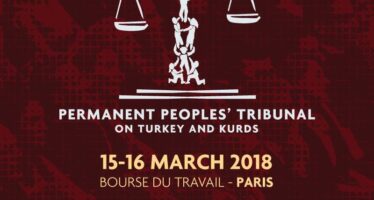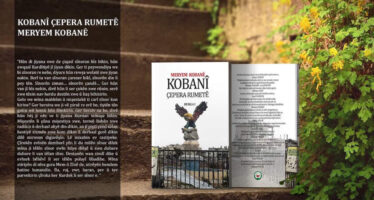Free At Last! Palestinian Poet Dareen Tatour Finally Released by Israelis

![]()
“Free at last! Free at last! Thank God Almighty, we are free at last!”
Martin Luther King, Jr. “I Have a Dream.”
Thursday, 20 September, 2018 Palestinian poet Dareen Tatour, was released from prison by the Israeli authorities after completing her last five-month prison sentence.
On her release she said:
“I am very happy to have freedom at least after three years in prison, remand, house arrest with an electronic cuff and again house arrest…At last I’m free, and I will continue writing. I will not stop. Of course I won’t. The whole case was about a poem.”
She had already spent more than two years and eight months between prison and house arrest for “incitement to violence” and “support of a terrorist organization” for her poem, “Resist, My People, Resist Them,” and her Facebook posts:
“One said, “Allah Akbar and Baruch Hashem, Islamic Jihad declared intifada throughout the whole West Bank and expansion to all Palestine. We should begin inside the Green Line,” a post that got 35 likes. The second showed the wedding of Asra’a Abed, a Nazareth resident who was shot and wounded after drawing a knife at the central bus station of Afula, with the post, ‘I’m the next martyr.’” (Noa Shpigel)
She had finally been convicted on all counts in May 2018 and was sentenced to five months in prison
Dareen Tatour
…a Palestinian poet from the village of Reineh (between Nazareth and Qana of Galilee), she was arrested at 3am on 11 October 2015, on the charge of “incitement (to violence) through social media.” That same month in 2015, violence in the occupied Palestinian territories and in Israel took the lives of 199 Palestinians and 28 Israelis. The charge against her carried a potential 8 year prison sentence. She spent the first 3 months in 3 prisons (Kishon, Damon and Hasharon) before being remanded to house arrest in Tel Aviv away from her family. In July 2016 she was allowed to continue her house arrest in Reineh with her family.
In an earlier interview she said:
“I think what happened is part of a systematic policy against Palestinians in general and against the Arab minority in Israel in particular. What happened with me is part of the occupation under which we Palestinians live, and part of the discrimination we face from all parties and political institutions of the state.”
Dareen Tatour (“I am accused of words, / my pen the instrument.”) was one of 400 Palestinians in 2016 arrested by Israeli authorities because of their use of social media to resist Israeli violence against the Palestinian people. As Al Jazeera had reported at the time:
“…she had posted a picture of Israa Abed – a Palestinian woman shot at a bus station in Afula while brandishing a knife – with the comment, “I am the next martyr.” ‘What I meant with that post was that I, as a Palestinian, or any Palestinian, could be killed at any time,’ Tatour told Al Jazeera. On November 2, Tatour was initially charged with inciting violence and terrorism, as well as supporting a terrorist group, in relation to posts on her Facebook and YouTube pages. Since then, the specifics of the charges against her have shifted, and now relate to a poem that was posted to her YouTube account.”
The poem on trial, translated by Tariq al Haydar and whose title translates roughly as “Resist my people, resist,” was published on ArabLit.org in April 2016:
Resist, My People, Resist Them
(Qawim ya sha’abi, qawimhum)
Resist, my people, resist them.
In Jerusalem, I dressed my wounds and breathed my sorrows
And carried the soul in my palm
For an Arab Palestine.
I will not succumb to the “peaceful solution,”
Never lower my flags
Until I evict them from my land.
I cast them aside for a coming time.
Resist, my people, resist them.
Resist the settler’s robbery
And follow the caravan of martyrs.
Shred the disgraceful constitution
Which imposed degradation and humiliation
And deterred us from restoring justice.
They burned blameless children;
As for Hadil, they sniped her in public,
Killed her in broad daylight.
Resist, my people, resist them.
Resist the colonialist’s onslaught.
Pay no mind to his agents among us
Who chain us with the peaceful illusion.
Do not fear doubtful tongues;
The truth in your heart is stronger,
As long as you resist in a land
That has lived through raids and victory.
So Ali called from his grave:
Resist, my rebellious people.
Write me as prose on the agarwood;
My remains have you as a response.
Resist, my people, resist them.
Resist, my people, resist them.
Reminds you, in a different tone, for a different time, of Martin Luther King Jr.’s “I Have a Dream“, his public speech delivered to over 250,000 civil rights supporters from the steps of the Lincoln Memorial in Washington, D.C during the March on Washington for Jobs and Freedom on August 28, 1963, ending:
“And if America is to be a great nation, this must become true.
So let freedom ring from the prodigious hilltops of New Hampshire.
Let freedom ring from the mighty mountains of New York.
Let freedom ring from the heightening Alleghenies of Pennsylvania.
Let freedom ring from the snowcapped Rockies of Colorado.
Let freedom ring from the curvaceous slopes of California.
But not only that: Let freedom ring from Stone Mountain of Georgia.
Let freedom ring from Lookout Mountain of Tennessee.
Let freedom ring from every hill and molehill of Mississippi.
From every mountainside, let freedom ring.
And when this happens, when we allow freedom [to] ring,
when we let it ring from every village and every hamlet,
from every state and every city,
we will be able to speed up that day
when all of God’s children, black men and white men,
Jews and Gentiles, Protestants and Catholics,
will be able to join hands and sing in the words of the old Negro spiritual:
Free at last! Free at last!
Thank God Almighty, we are free at last!”
…From the southern and (northern states) of America…to South Africa and now to Palestine and Israel and the occupied Palestinian territories, (aware that the current Israeli regime dislikes the use of the word “apartheid”)…
…following the release of poet, Dareen Tatour…
time now, Israel: for more freedom…
séamas carraher
Image:
The Palestinian poet Dareen Tatour
By Danielle Alma Ravitzki
[CC BY-SA 4.0 (https://creativecommons.org/licenses/by-sa/4.0)], from Wikimedia Commons
Excerpt From: Martin Luther King, Jr. “I Have a Dream”
“Text copyright © 1963 by Dr. Martin Luther King, Jr., copyright renewed 1991 by Coretta Scott King, and the Heirs to the Estate of Martin Luther King”
Read Also:
Palestinian Poet Convicted on Incitement…for Poem
‘It Was Another Year’s September’
‘Resist, My People, Resist Them’
More work by Dareen Tatour in translation:
‘Rebellion of Silence’: New Work by Poet-on-trial Dareen Tatour
‘A Poet’s Hallucinations,’ by Dareen Tatour
A New Translation of Palestinian Poet Dareen Tatour’s ‘I… Who Am I?’
‘A Poet Behind Bars’: A New Poem from Dareen Tatour
New Poems by Dareen Tatour, Under House Arrest in Israel
Video:
Dareen Tatour reading ‘A Poet’s Hallucinations – Arabic & English
Related Articles
Human Rights. TURKEY ON ‘TRIAL’ Finally
![]()
the Permanent Peoples’ Tribunal will meet on 15 & 16 March to examine the crimes committed by the Turkish Republic against the Kurdish people, both on its own (and Kurdish) territory and abroad
The Rojava Revolution and the role of Women
![]()
All the different ethnic and beliefs in Rojava and Northern Syria joined the 19 July Revolution with their own features and identities
The book by YPJ commander Meryem Kobanê: A dream destroying borders
![]()
The first volume of the book of Meryem Kobanê, one of the commanders of the historical Kobanê war and victory, about those days, “Kobanê: Çepera Rûmetê” was published by Şilêr Publications





